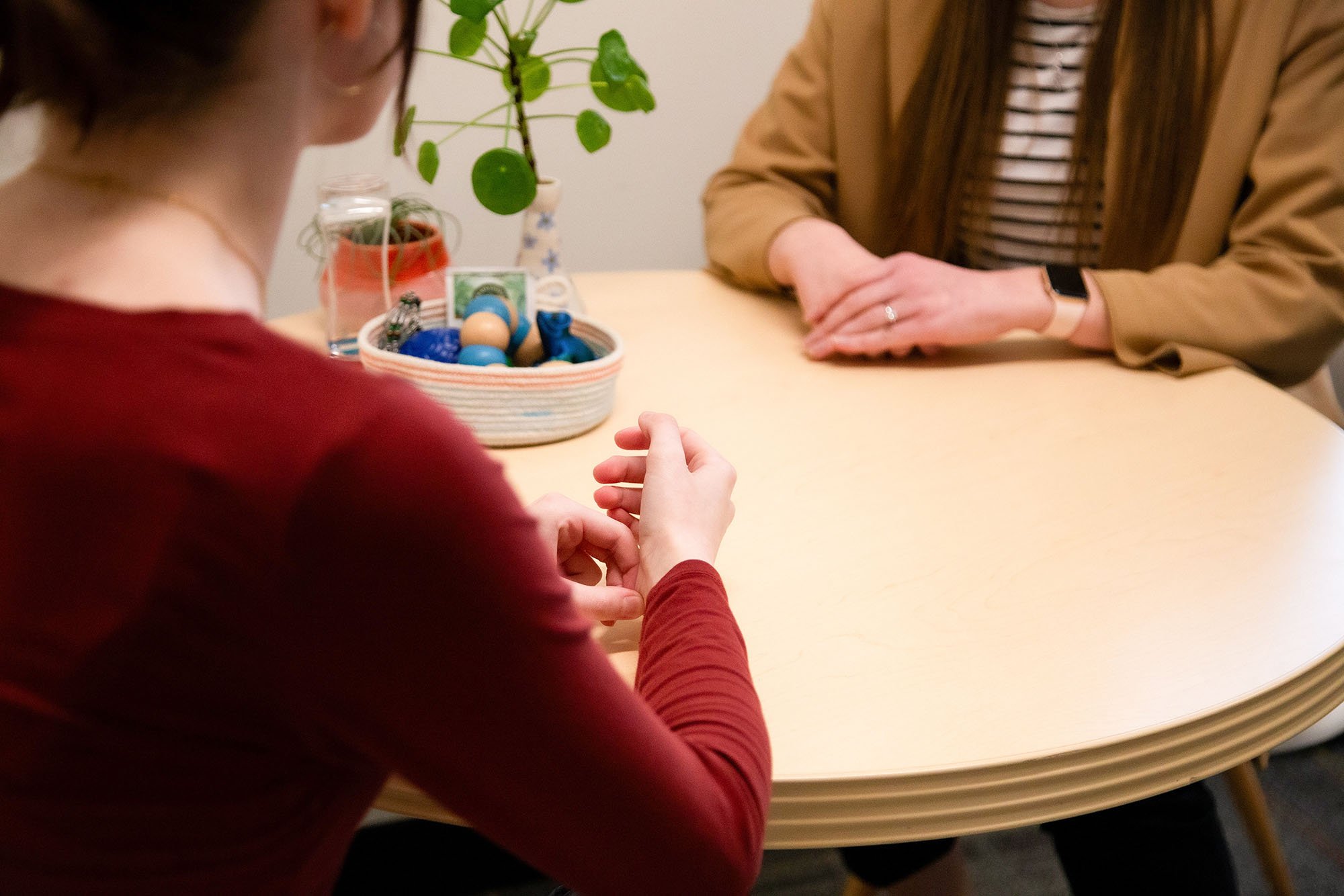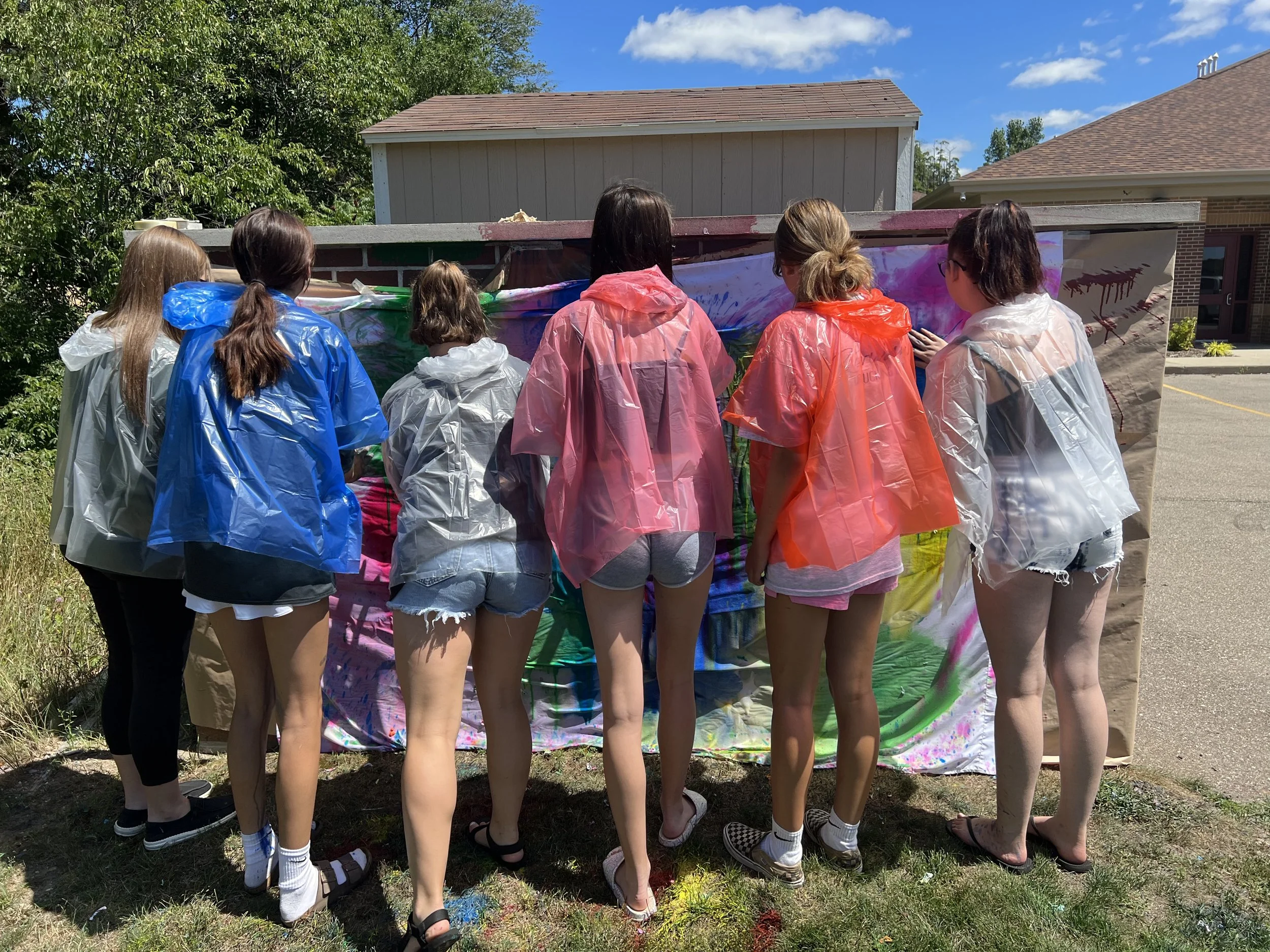
Counseling
We Are Here to Help
The CAC is committed to providing a safe place for children to begin the healing process after they have experienced abuse. Our team of Master’s level social workers provides evidence- based therapy to children, adolescents, and their non-offending caregivers. The services provided at the Children’s Advocacy Center are available free of charge. Clinical staff are specially trained in evidence-based treatment approaches with a firm understanding of the effects of trauma. Treatment is available both in person and virtually through telehealth. Play, expressive art, and sensory interventions are utilized in the treatment provided to children, adolescents, and adults.
Our Expertise
Our team of Master’s level social workers provides evidence-based/ evidence-informed therapy to children of every age. Our counselors are trained in the following areas:
Trauma Focused Cognitive Behavioral Therapy (TF-CBT)
TF-CBT is a child and parent psychotherapy approach for children and adolescents who are experiencing emotional and behavioral difficulties related to traumatic life events. This type of evidence-based treatment has been determined as best practice for use with abused and traumatized children. TF-CBT helps families to manage feelings, talk about the trauma, and develop plans for feeling safe in the future.
Child and Family Traumatic Stress Intervention (CFTSI)
CFTSI is short-term (5‐8 sessions), evidence‐based, early intervention for children 7 to 18 years old that reduces traumatic stress reactions. CFTSI is implemented following a traumatic event or the disclosure of physical or sexual abuse. The success of CFTSI comes from increasing communication and family support, identifying prominent traumatic stress reactions, and pairing those reactions with coping skills to reduce the potential onset of PTSD.
Problematic Sexual Behavior- Phase Based Treatment (PSB-PBT)
PSB-PBT, a short-term skills-based treatment, is designed for children under the age of 10 who are displaying problematic sexual behaviors. This treatment aims to address the cause of the problematic sexual behavior that is being displayed by working with the caregiver(s) and child to decrease these behaviors.
Sensory Motor Arousal Regulation Treatment (SMART)
Sensory Motor Arousal Regulation Treatment is a form of counseling specially designed for children and youth who have been affected by complex trauma (i.e. sexual abuse, violence, adoption, etc.). SMART includes three major components: emotional and behavioral regulation, trauma processing, and attachment. To address emotional regulation, SMART uses concepts and clinical evidence from the sensory integration field. The basic equipment, including physio balls, weighted blankets, and crash cushions, provided different types of sensory input for arousal regulation. To address trauma processing, this treatment uses embodied action, games, and symbolic and dramatic play. To stimulate attachment, SMART therapists work with children and their non-offending caregivers to improve relational security through active, playful engagement. Children who are engaged in SMART can become more self-aware and calm in situations that typically cause stress.
Eye Movement Desensitization & Reprocessing (EMDR)
EMDR is an evidence-based treatment that was originally developed to treat post-traumatic stress disorder (PTSD), but it has since been used to treat a wide range of mental health issues. EMDR recreates eye movements similar to when we are in the rapid eye movement (REM) stage of sleep. This type of therapy shows us that the mind can heal from emotional trauma, similar to how our body can heal from physical trauma. EMDR is safe for kids, teens, and adults.
Learn More about Counseling Services
If you are interested in exploring counseling options for yourself or your child, please reach out to our Clinical Services Supervisor, Mariah Johnston, at mjohnston@cac-ottawa.org, to learn more.
Counseling Groups & Workshops
The Children’s Advocacy Center strives to meet the unique needs of all of our clients by providing a range of treatment options. The healing that happens in community can be an essential component of moving forward after abuse. We offer a variety of groups including:
TEEN GROUPS: SKILL-BUILDING, SUPPORT, AND PROCESSING
These groups are for survivors of sexual assault and abuse ages 14-18. Participants will learn about the dynamics of sexual abuse and trauma, effective emotion processing techniques, coping skills, setting boundaries, and healthy relationships in a supportive peer environment. Expressive art, writing activities, music, movement, and more are tools used in this group to help build these skills. Participants will learn about themselves while also having the opportunity to connect with a group of teens that share a similar experience.
NON-OFFENDING PARENT / CAREGIVER SUPPORT GROUP
The caregiver support group provides an opportunity to meet with other parents/caregivers in a secure, supportive, and nonjudgmental space. The goal of this support group is for caregivers to have a community of supports who relate and understand the challenges paired with providing care to someone who has experienced sexual assault and abuse. This is a collaborative group where participants take an active role in choosing what topics are discussed, and facilitators tailor the group sessions to the needs of the participants. This is an open group, meaning participants may join the group at any time within the months the group is being held.
CHILD SKILL-BUILDING GROUP
A group for children aged 6 to 10 years old to learn about and practice a range of coping skills such as breathing techniques, emotion release, stress relief, and relaxation techniques. Psychoeducation on the skills is also provided to caregivers to help the child continue to build these skills at home and school.
PARTNERING WITH PARENTS GROUP
The goal of this group is to create a supportive space for non-offending parents/caregivers of children who have experienced sexual assault and abuse. This group brings those parents together to learn about trauma and dynamics of sexual abuse. In addition, participants will obtain practical coping tools to build resilience for themselves and their families as they navigate changes in their family systems that result from the assault and abuse.
WORKSHOPS
Throughout the year, we host one-time workshops for both kids and caregivers covering a variety of topics such as self-care, regulation, healthy relationships, and connection. We also have short-term groups running throughout the year depending on the current client’s need and what partnerships we have with local organizations. These groups are always changing as we enjoy offering something new to our clients. Visit our events page to view any upcoming workshops!
Learn More about Counseling Groups
In hopes of providing the most meaningful and effective services for our clients and families, we tailor groups to meet clinical best practices. For this reason, our groups are always evolving. Please reach out to our Clinical Services Supervisor, Mariah Johnston, at mjohnston@cac-ottawa.org, for our current and upcoming groups, or to reach out if you or someone you know is interested in attending a group or workshop.

Client Testimonials
-
“After meeting with my therapist, I realized how important it was to have a place to talk about the things that I have experienced. She let me know what I was going through and how I was coping were normal responses. She helped me figure out ways to show my feelings and cope with them. She believed and supported my experience, and that was so important in my healing.”
— CAC Client
-
"Therapy at the CAC is so personal. Our family had such an array of different needs. Each one felt supported through the different options. Play therapy, art therapy, sensory play, one on one talk sessions, EMDR, group sessions, court prep, and victim rights assistance."
— CAC Client
Child Sexual Abuse & Mental Health FAQs
-
In the short term, it’s not unusual for a child to develop some post-traumatic stress reactions that will respond to treatment. Others—particularly those who have suffered multiple traumas and received little parental support—may develop post-traumatic stress disorder, depression, and anxiety. Their ability to trust adults to take care of them may also be jeopardized. Sadly, when children do not disclose sexual abuse and/or do not receive effective counseling, they can suffer difficulties long into the future. Children who have the support of an understanding caregiver and effective treatment can recover without long-term effects.
-
There are three categories of symptoms that occur with post-traumatic stress reactions:
Hyperarousal means that the child is nervous and jumpy, has a heightened startle response, and may react more strongly to any anxiety-producing situation.
Re-experiencing means that the child may keep seeing mental images related to the abuse, or relive some aspects of the experience, either while awake or during sleep in the form of nightmares. A child may have other sleep disturbances such as trouble falling asleep or staying asleep. Younger children may have generalized fears or nightmares about other scary things such as monsters chasing them. With an older child, the nightmares are more likely to be directly related to the trauma. Reexperiencing also includes reactions to traumatic reminders: any thing, person, event, sight, smell or sound connected to the abuse.
Avoidance means that a child avoids exposure to reminders of the trauma and often tries to avoid thinking about the abuse altogether.
-
Sexual abuse often results in difficult thoughts, feelings, questions, and behaviors in kids. The investigative component can also have a significant emotional impact. It’s helpful for the parent and child to have support from a mental health professional and assistance in understanding the abuse and reactions to it. In many cases, a child may not need lengthy, intensive therapy, but it’s helpful for the child and parent to sit down with a trained professional and talk through what has happened and to make sure the child understands and feels safe talking about his or her feelings. Children may blame themselves or hold other unrealistic ideas or beliefs about the abuse (cognitive distortions) that need to be corrected. Parents may also benefit from talking to a professional who can assist them in overcoming the distress naturally associated with discovering that their child has been sexually abused. With professional support, many children and parents effectively recover and may feel stronger and closer as a family in the aftermath of a traumatic experience.
-
No, counseling is a place for your child to be able to process their experience and find ways to alleviate their symptoms through the different models our clinicians utilize. The benefit of counseling at a CAC is that clinicians will be familiar with the case and dynamics, therefore your child will not need to repeat their experience. Clinicians use gradual exposure in combination with coping and regulation tools to ease emotional distress and responses to triggers your child may have.
-
Our therapists use an individualized approach in client sessions which means treatments used are determined by what is the best fit for your child. If a child finds art helpful in coping and expression, therapists can use our art therapy room to lean into your child's interest. If your child would benefit from sensory regulation and movement, we have our SMART room we can meet in. (See our "previous our space" section for more information on our spaces!) We know that there is no one treatment that works for everyone, so our therapists work in collaboration with you to assess the best approach for your child to have a space to heal from their experiences.







